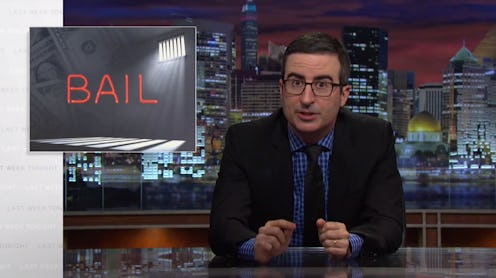News
John Oliver Just Ruined 'Dog The Bounty Hunter'

Just like pretty much all of John Oliver's previous segments, the latest target of his wrath totally deserves the scrutiny. On Sunday night's episode of Last Week Tonight, John Oliver slammed the U.S.'s flawed bail system, which he says has become just another way to keep poor people in jail. And not only does the system unfairly favor the wealthy, he adds, but it punishes the less-wealthy by essentially turning them into human targets and sicking bounty hunters on them, as seen on shows like Dog the Bounty Hunter. Oliver wants to change all of that, by proposing a reality show of his own.
Oliver opens his segment with a very compelling comparison that underscores the unfairness of the bail system. One clip showed that a family man who was charged with a nonviolent crime had to sit in Rikers Island, which has been ranked one of the 10 worst prisons in America, because he couldn't afford the $1,000 bail. Another clip showed the infamous real estate heir Robert Durst, who has been charged with two separate counts of murder, recounting how he paid $250,000 to escape jail. He flippantly says, "Goodbye, $250,000. Goodbye, jail!"
That, in a nutshell, is the American bail system, Oliver says.
The unfairness is so staggering that a 2013 analysis found that nearly 40 percent of the New Jersey jail population was made up of people who couldn't afford bail. And besides sitting in jail, there are other equally terrible consequences for those who cannot afford to make bail, like getting fired from their job.
Jail can do for your actual life what being in a marching band can do for your social life. Even if you're just in for a little while, it can destroy you.
Another option those who can't afford bail have is pleading guilty, which gets you out of jail but could obviously ruin your life in the long run. We've all seen that "Have you ever been convicted of a crime?" question on job applications.
Then there's a third, perhaps worst, option: commercial bail bondsmen.
You know, the people who make amazing ads, like these:
And what happens if you have a bail bondsman pay for your bail but then don't show up for trial? You become a human target for a bounty hunter, who Oliver says have a "frightening amount of power." They can cross state lines, break into homes, and do almost anything necessary to capture someone, he says. And in 18 states, anyone can become a bounty hunter, regardless of their education, training, or their own criminal history.
Becoming a bounty hunter is basically a lot like becoming a social media expert — all it takes is wanting it bad enough and not caring about whether strangers hate you or not.
Oliver further emphasizes the point that "any idiot can become a bounty hunter" by showing clips from the A&E show Dog the Bounty Hunter.
And the many shows that it's inspired.
It says something about how comfortable we all are with how our bail system works that a TV show where people with guns hunt humans for sport seems legitimate because we all just think, "Well, they're just doing their actual job."
But perhaps what's most shocking about the bail system is not how flawed it is but how long America has been aware of its flaws, Oliver says. Oliver plays a clip from 1964 in which then-New York City Commissioner of Correction Anna Cross says, "Remaining in jail because you can't get bail is really being punished before you're even found guilty."
That's right. This problem has been obvious since it was considered OK to wear a wastebasket on your head.
On the bright side, some federal courts and judges in Washington D.C. are only setting bail when defendants can afford it. As a result, far fewer people are spending unnecessary time in jail.
It's a testament to the state of our justice system that that qualifies as bragging, because that should be the norm. It's like a bus driver showing up at school saying, "23 kids picked up, 23 kids dropped off. I pitched a perfect game."
Oliver then explains how this pretrial system works exactly: if a judge decides the charged is not dangerous or a flight risk, they can go home. They might get monitored with drug tests, ankle bracelets, and phone calls. This system has been successful in states ranging from Oregon to Florida.
It is a truly frightening state of affairs when Florida is a model for progressive change.
Not only are pretrial services more effective, but they're also cheaper, sometimes as little as a 10th of the cost of keeping someone locked up.
Which makes sense because calling someone to check in costs virtually nothing. This message brought to you by your mother.
So if pretrial services are fairer and cheaper, why are they not the norm? Because, Oliver says, America's idea of justice looks like Dog the bounty hunter. Maybe the solution is coming up with a new kind of reality TV show to change our perceptions. Maybe something like this.
Watch the entire segment below.
Images: Last Week Tonight With John Oliver/YouTube